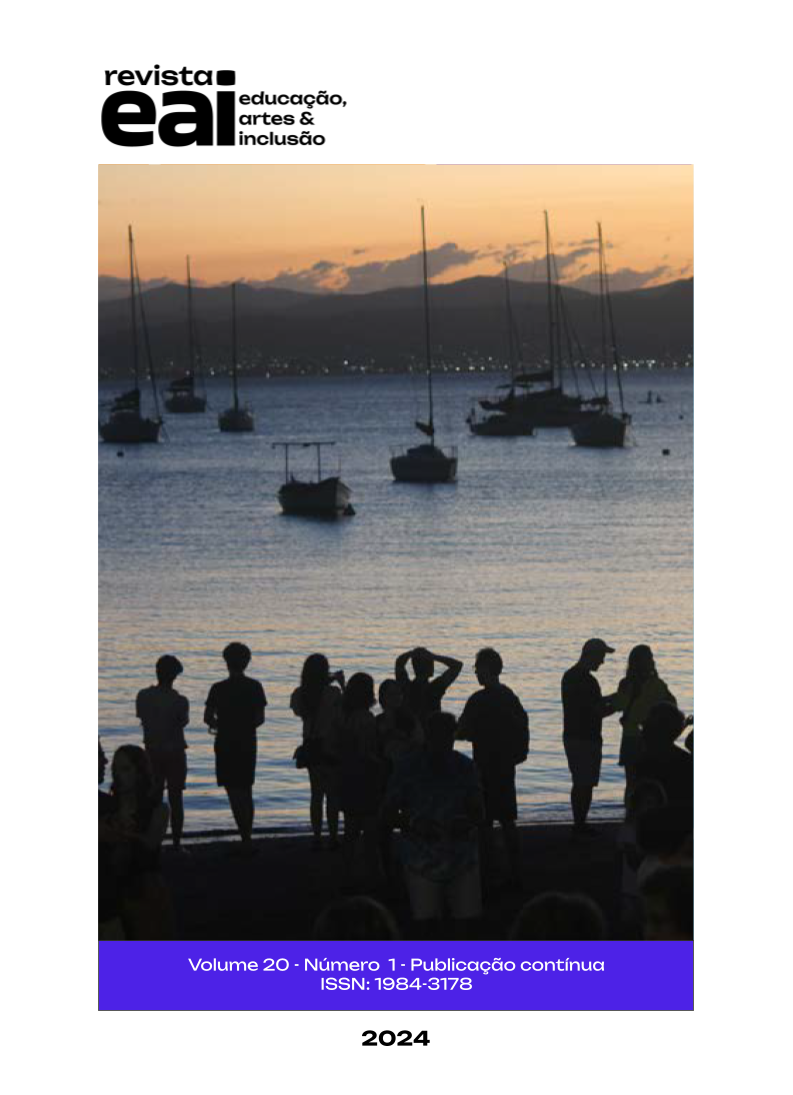Right, inclusion and art education: a experiment turned to the construction of the critical consciousness
DOI:
https://doi.org/10.5965/198431782012024e0063Keywords:
fundamental rights, arts teaching, habitus, existentialist morality, citizenshipAbstract
This article presents a set of reflections on the educational action entitled: Fundamental Rights and Contemporary Art: a multidisciplinary dialogue aimed at public high school students. The development of the creative process and knowledge about human rights enabled students to deepen their critical awareness of important issues arising from themselves and their collectivity. Their reports demonstrated aspects of the recognition and affirmation of themselves and their groups, in addition to the awareness of the symbolic violence to which they are subjected. The results denoted the achievement by students of a certain level of opposition to the barrier that impedes the exercise of citizenship provided for as the foundation of the Democratic Rule of Law in the Brazilian Federal Constitution/1988.
Downloads
References
ALBERTONI, Felipe. Unicamp: 82% dos aprovados em medicina cursaram a escola pública.
Globo. 2016. Disponível em: <http://g1.globo.com/sp/campinas-regiao/noticia/2016/02/uni-
camp-5-cursos-mais-disputados-tem-43-de-egressos-da-rede-publica.html>. Acesso em: 18 jan. 2018.
BEAUVOIR, Simone de. Por uma moral da ambiguidade. Rio de Janeiro: Nova Fronteira, 2005.
BOURDIEU, Pierre. A economia das trocas simbólicas. São Paulo: Perspectivas, 2004.
____. O poder simbólico. Rio de Janeiro: Bertrand Brasil, 2003.
____.Pierre Bourdieu: Sociologia. Renato Ortiz (Ed.). São Paulo: Ática, 1983.
BOURDIEU, Pierre; PASSERON, Jean-Claude. A reprodução: Elementos para uma teoria do sistema de ensino. Petrópolis: Vozes. 2014.
BRASIL. Presidência da República. Constituição da República Federativa do Brasil de
Brasília, DF, 1988. Disponível em: <http://www.planalto.gov.br/ccivil_03/constituicao/
constituicaocompilado.htm>. Acesso em: 18 Jan. 2018.
BRASIL. Presidência da República. Lei de Diretrizes e Bases da Educação Nacional. Lei número 9.394, 20 de dezembro de 1996. Estabelece as diretrizes e bases da educação nacional. Brasília, DF, 1996. Disponível em: <https://www.uvv.br/a-uvv/cpa/anexo/ldb.pdf>. Acesso em: 18 jan. 2018.
DIAS, Reinaldo. Sociedade e estrutura social. In: DIAS, Reinaldo. Introdução à sociologia.
São Paulo: Pearson Prentice Hall, 2005, p. 256-269.
FREIRE, Paulo. Pedagogia da autonomia: saberes necessários à prática educativa. São Paulo: Paz e Terra, 1996.
____. Pedagogia do oprimido. Rio de Janeiro: Nova Fronteira. 2012.
FREITAS, Luís Carlos de. Os reformadores empresariais da educação: da desmoralização do
magistério à destruição do sistema público de educação. Educação & Sociedade, 33 (119), p.
-404. 2012. Disponível em: <http://www.scielo.br/pdf/es/v33n119/a04v33n119.pdf>. Acesso
em: 18 jan. 2018.
MARCHINHACKI, Romualdo Paulo. Direitos fundamentais: aspectos gerais e históricos. Re-
vista da Unifebe (Online), Brusque (SC), 11, p.166-179, 2012.. Disponível em: . Acesso em: 18 jan. 2018.
OLIVA, Juliana. Capítulo 3: Do mito à situação. In: Identidade e reciprocidade em O Segundo
Sexo de Simone de Beauvoir (Dissertação de Mestrado). Universidade São Judas Tadeu:
São Paulo. 2013. Disponível em: <http://www.usjt.br/biblioteca/mono_disser/mono_diss/
/264.pdf>. Acesso em: 18 jan. 2018.
ONU. Organização das Nações Unidas. Declaração Universal dos Direitos Humanos. 2020.
Disponível em: < https://brasil.un.org/pt-br/91601-declaracao-universal-dos-direitos-humanos
>. Acesso em: 16 set. 2021.
ORSI, Carlos. Escola Pública Domina Vestibular. Página de Notícias Unicamp. 2012. Dispo-
nível em: <http://www.unicamp.br/unicamp/noticias/2016/02/12/escola-publica-domina-vesti-
bular>. Acesso em: 18 jan. 2018.
SANTOS, Boaventura de Sousa. Um discurso sobre as ciências. São Paulo: Cortez, 2010.
Downloads
Published
How to Cite
Issue
Section
License
Copyright (c) 2024 Selma Machado Simão, Ana Elisa Spaolonzi Queiroz Assis, Alan Isaac Mendes Caballero

This work is licensed under a Creative Commons Attribution-NonCommercial 4.0 International License.
Copyright Statement
The Educação, Artes e Inclusão is a journal that follows the Free Access Policy. The articles published by the journal are free of charge, intended for educational and non-commercial applications. The articles whose authors are identified represent the expression from the point of view of their authors and not the official position of the Educação, Artes e Inclusão Journal or the Educação, Artes e Inclusão Research Group.
Authors who publish in this journal agree to the following terms:
(A) Authors retain the copyright and grant the journal the right of first publication, with the work simultaneously licensed under the Creative Commons Attribution License which allows the sharing of the work with acknowledgment of authorship and initial publication in this magazine.
(B) Authors are authorized to take additional contracts separately, for non-exclusive distribution of the version of the work published in this journal (eg publish in institutional repository or as a book chapter), with acknowledgment of authorship and initial publication in this magazine.
(C) This journal provides public access to all of its content, as this allows for greater visibility and scope of published articles and reviews. For more information on this approach, visit the Public Knowledge Project.
This journal is licensed under a Creative Commons Attribution-NonCommercial-ShareAlike 4.0 International License. This license allows others to remix, adapt and create from your work for non-commercial purposes, and although new work must give you due credit and cannot be used for business purposes, users do not have to license such derivative works under the same terms.



